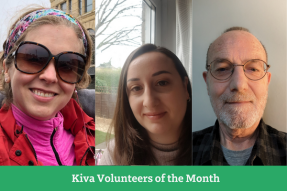What can I give back?
This has been a recurring question I’ve asked myself while interviewing Kiva borrowers in Nicaragua. As a Kiva Investment Fellow, I was sent to collect data, audit payment reporting and report on metrics.
While I consider myself part of the less colorful side of Kiva, it’s work I enjoy the most because of the fulfillment I have in quantifying and measuring financial impact.
As I sat in front of these borrowers and felt and saw the fruits of their toilsome labor, I felt empty-handed. It’s similar to when you pour your heart to someone, and when you ask them how they’re doing, they answer, “Great, thanks.” Challenged by the fact that I have very few tangible skills -- I could not tend to a business, family, and farm with the same grace of these women -- I began to ponder.
The revelation came by just looking down and seeing my phone.
A huge component to becoming a Kiva borrower is having your photograph taken to be shared on our site. It is an integral part of their loan profile, and one that provides transparency to the 1.8 million lenders on Kiva.
But what if those borrowers could store those pictures? Better yet, what if they could store their pictures in portrait mode? Now we’re talking.
Smartphone usage in developing countries is very high; almost everyone you speak to has a device or a family member with one. Leapfrog technology, coupled with cheap input costs, has allowed the global prevalence of WhatsApp and other communication platforms. Smartphone penetration rates in Latin America stood at 61 percent in 2017 and it’s expected to reach 76 percent by 2025.
Can this lend a hand to empowerment? One TEDTalk I love is social psychologist Amy Cuddy’s lecture on how body language affects how others see us, and may also change how we see ourselves.
And this is what led to my side project.
Each woman borrower I met, I asked to take her photo. While apprehensive at first, each woman gradually got really into it. I told them about the psychological effects of power poses and how one’s body language can shape their ideas and improve their confidence.
These women are true superheroes but often don’t realize it themselves. By capturing these women strutting their stuff, laughing and just taking a break, a tool and a keepsake were created. After our photoshoot, we exchanged WhatsApp numbers and I sent over this digital memento.
 "Those photos look good!" one borrower told me when I sent her photos on WhatsApp.
"Those photos look good!" one borrower told me when I sent her photos on WhatsApp.
The idea of empowerment isn’t just a Western concept - it’s a universal principle. What gets lost in translation at times is the approach. These photos were my approach to female empowerment, which is still a work in progress for me too.
PREVIOUS ARTICLE
How Kiva is changing the story for internally displaced people in Colombia →NEXT ARTICLE
Monthly Good is the easiest New Year's resolution to keep →
















